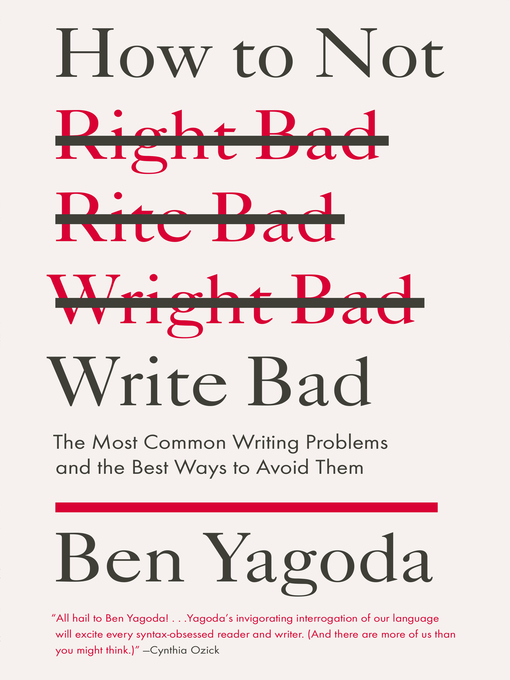How to Not Write Bad
The Most Common Writing Problems, and the Best Ways to Avoid Them
He offers advice on what he calls "not-writing-badly," which consists of the ability, first, to craft sentences that are correct in terms of spelling, diction (word choice), punctuation, and grammar, and that also display clarity, precision, and grace. Then he focuses on crafting whole paragraphs—with attention to cadence, consistency of tone, sentence transitions, and paragraph length.
In a fun, comprehensive guide, Yagoda lays out the simple steps we can all take to make our writing more effective, more interesting—and just plain better.
-
Creators
-
Publisher
-
Release date
February 5, 2013 -
Formats
-
Kindle Book
-
OverDrive Read
- ISBN: 9781101602126
-
EPUB ebook
- ISBN: 9781101602126
- File size: 582 KB
-
-
Languages
- English
-
Levels
- Lexile® Measure: 1040
- Text Difficulty: 6-8
-
Reviews
-
Kirkus
January 15, 2013
A forgiving--a purist might say overly forgiving--handbook for those in need of remedial grammar lessons, a category that includes most college students. Yagoda (Journalism/Univ. of Delaware; Memoir: A History, 2010, etc.) appreciates the Anne Lamotts, William Zinssers and E.B. Whites of the world, but he fears that their entreaties to add beauty to the language are misplaced. "Most students, I've found, can't handle writing 'well.' At this point in their writing lives," he writes, "that goal is simply too ambitious." He later elaborates: The chief task is to rid students of such bad habits as stacked prepositional phrases and dysparallelism. Thus this handbook and its grating title: The goal is not to write well, but not to write badly--or, now that we don't have to worry about split infinitives, to not write badly. Yagoda strives a little too hard for laughs at times, but showmanship is part of the game. Much of what he has to say is the stuff of every other writing handbook, especially the admonition that every good writer--every not-bad writer, that is--is a good reader. But Yagoda occasionally turns in a truly fresh take on a problem, and this dictum alone is worth the price of admission: "When possible, make the subject of a sentence a person, a collection of persons, or a thing." Pair that with the injunction to avoid two spaces after a period, and you've got the makings of improved writing already, even allowing for Yagoda's liberal take on split infinitives and the use of "they" as the pronoun for a singular subject. It won't take the place of Strunk and White, but a useful addition to any writer's bookshelf.COPYRIGHT(2013) Kirkus Reviews, ALL RIGHTS RESERVED.
-
Formats
- Kindle Book
- OverDrive Read
- EPUB ebook
Languages
- English
Levels
- Lexile® Measure:1040
- Text Difficulty:6-8
Loading
Why is availability limited?
×Availability can change throughout the month based on the library's budget. You can still place a hold on the title, and your hold will be automatically filled as soon as the title is available again.
The Kindle Book format for this title is not supported on:
×Read-along ebook
×The OverDrive Read format of this ebook has professional narration that plays while you read in your browser. Learn more here.

